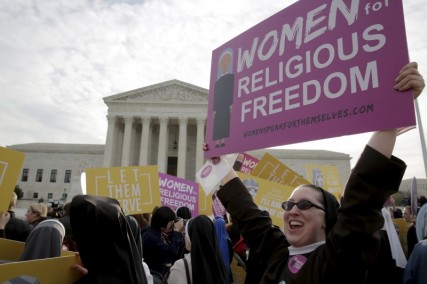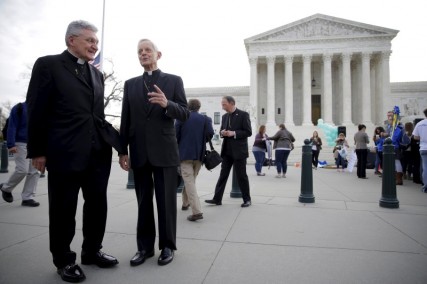By Lawrence Hurley
WASHINGTON (Reuters) – The Supreme Court on Wednesday headed toward a possible 4-4 split over a legal challenge by Christian nonprofit employers who object to providing workers insurance covering birth control as required by President Barack Obama’s healthcare law.
An evenly split ruling, with the court’s four liberals siding with the Obama administration against the four conservative justices, would leave in place lower-court rulings rejecting challenges brought by the Christian organizations that opposed providing contraception coverage for religious reasons.
Justice Anthony Kennedy, who often casts the deciding vote in close cases, appeared more aligned with the court’s three other conservatives in favoring the challengers, which primarily were Roman Catholic including the archdiocese of Washington.
Only eight justices heard the latest high-profile conservative challenge to the law, considered Obama’s signature legislative achievement, following the Feb. 13 death of conservative Justice Antonin Scalia.
The court heard 90 minutes of arguments in the case on the sixth anniversary of Obama signing the Affordable Care Act, known as Obamacare, into law. The law has expanded medical insurance coverage to millions of previously uninsured Americans even as conservative critics describe it as government overreach and congressional Republicans have mounted repeated failed efforts to repeal it.
Conservatives have mounted numerous legal challenges to the law, with the Supreme Court in 2012 and 2015 issuing high-profile rulings leaving it intact.
The court heard arguments on seven related cases focusing on whether nonprofit entities that oppose the requirement can object under a 1993 U.S. law called the federal Religious Freedom Restoration Act to a compromise measure offered by the government.
A 4-4 split would set no national legal precedent against such claims, and would allow them in parts of the country where lower courts permit such lawsuits to proceed.
The liberal justices raised concerns about allowing the nonprofit religious organizations the same exemptions that churches get. Justice Elena Kagan said Congress would then stop giving churches exemptions when it passes laws, which would be a “mortal danger to churches.”
Another liberal, Justice Sonia Sotomayor, echoed that sentiment when referring to the dangers of widespread exemptions from government programs.
“How will you ever have a government that functions?” Sotomayor asked.
Liberal Justice Stephen Breyer noted that other religious groups regularly have contended with government decisions they opposed. He cited Quakers, who oppose war but are still required to pay taxes that fund military spending, as an example.
Conservative Chief Justice John Roberts said the challengers’ contention that the government is seeking to “hijack” their health insurance plans in order to provide contraception coverage appeared to be an “accurate description.”
He and fellow conservative Justice Samuel Alito raised the question of whether there are other ways the coverage could be provided.
OPTING OUT
The Christian groups object to a compromise first offered by the Obama administration in 2013. It allows groups opposed to providing insurance covering birth control to comply with the law without actually paying for the required coverage.
Groups can certify they are opting out of the requirement by signing a form and submitting it to the government. The government then asks insurers to pick up the tab for the contraception.
The challengers contend the accommodation violates their religious rights by forcing them to authorize the coverage for their employees even if they are not paying for it.
Based on Kennedy’s previous approach, one question going into the hearing was whether he would be more sympathetic to the government than he was in a 2014 case concerning the same contraception requirement.
Kennedy was in the majority when the court ruled 5-4 that family-owned companies run on religious principles, including craft retailer Hobby Lobby Stores Inc, could object to the provision for religious reasons.
Kennedy wrote a concurring opinion then saying an accommodation like the one at issue on Wednesday could be acceptable. Nothing he said during the oral argument indicated he thinks the accommodation now before the court passes legal muster.
The religious freedom law states that objectors have a case if they can show that government action imposes a substantial burden on their religious rights. Kennedy strongly suggested he believes the burden was met, meaning the only remaining question would be whether the government has a compelling interest in providing contraception coverage and if the accommodation was the least restrictive means to reach that goal.
The case represents an uphill battle for the challengers, who lost all seven cases now before the Supreme Court in lower courts.
A Colorado-based order of Roman Catholic nuns called the Little Sisters of the Poor that runs care homes for the elderly was among the employers challenging the requirement.
Among the others were: Bishop David Zubik and the Roman Catholic Diocese of Pittsburgh; the Roman Catholic archdiocese of Washington, D.C.; Priests for Life; and East Texas Baptist University.
A ruling is due by the end of June.
(Reporting by Lawrence Hurley. Additional reporting by Joan Biskupic; Editing by Will Dunham)











I’m failing to see the argument here. These organizations are spending the time, money (a lot of money) and valuable space on the SCOTUS docket to complain that they have to submit a piece of paperwork about contraception coverage, essentially. They’ve already been offered a compromise – don’t want to pay for it because you object? Fine. The government will pick up the tab. Just fill out this form and turn it in. Unless it’s a big packet, I don’t see the substantial burden. It’s doesn’t cost you and your employees get what they want.
Is that arguably a threat to religious freedom, to agree to let someone else pay for something for you? To say otherwise seems like companies are requiring employees to adhere to the religious doctrine of the employer.
I mean. As a Jew, it’s become clear to me just how many Americans believe this is a Christian nation. The hysteria over the purported loss of (Christian) religious freedom here, there, and everywhere in America has seen to that. Yet many of the people who push RFRAs and seek to discriminate against LGBT folks are also fully aware that in other parts of the world, actual persecution of Christians is occurring. Not sure how they can maintain the cognitive dissonance of calling cake-shop scenarios persecution when, thousands of miles away, Christians are losing their actual heads.
Yeah, now from a more balanced view it seems…well…unbalanced. Here’s my perspective from Time in Christian Subculture®. Apologies if I’m telling you something you’re already familiar with…. it’s just what I know from growing up.
It’s a different world in there. There’s Christian radio, Christian books, Christian HISTORY books (kid you not) and all this stuff that honestly gives people an entirely different worldview. It’s possible, if you just hang out with other Christians and don’t put yourself out there/get to know different types of folks, that you can get the idea that these types of crises are what really matter (as compared to persecution) mainly because they’re the first step in a slippery slope of ‘zomg next they’re coming for our Bibles.’ That’s how the cognitive dissonance happens I think. It’s built slowly over time and strongly shored up by schools, institutions, etc that are separatist.
Is this possible? I guess. It doesn’t seem that likely, and IMO Christians aren’t helping with their behavior and actions toward other groups. They’re making it worse.